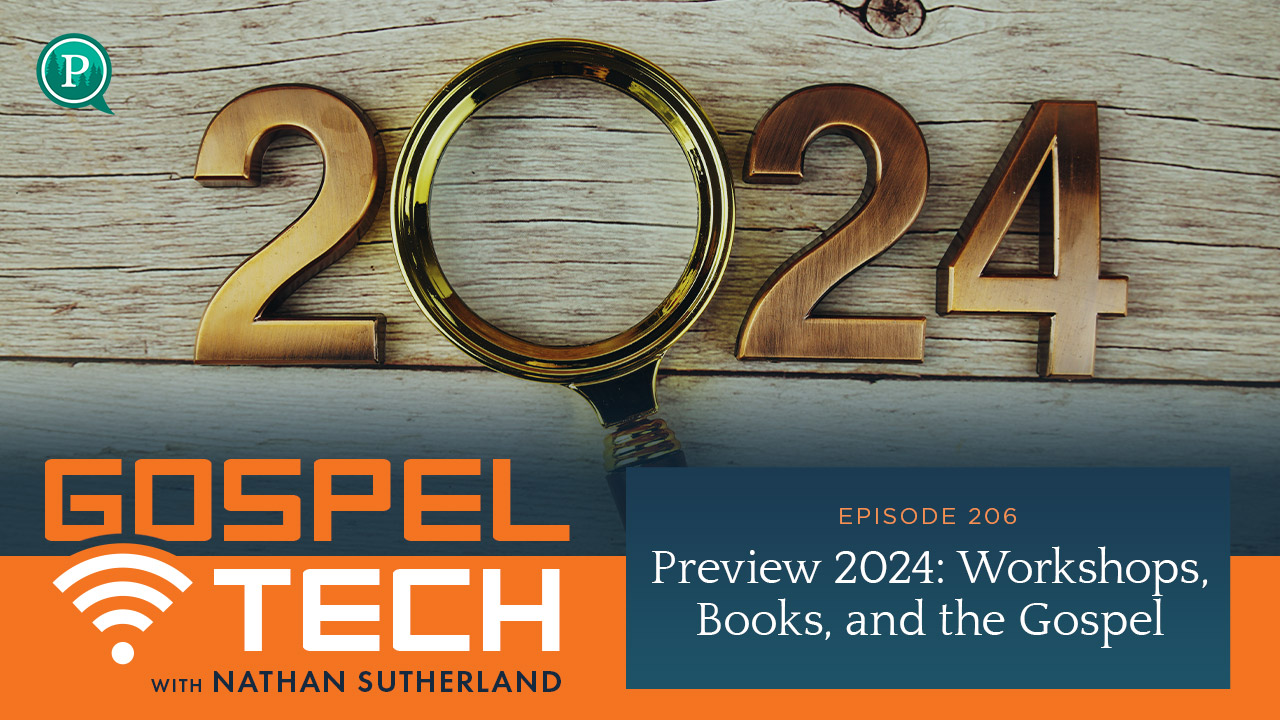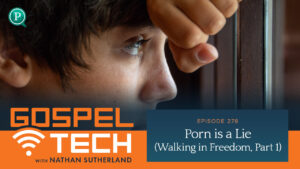I want to peel the curtain back a bit and dive a bit deeper into the three areas God has layed on my heart for the work of Gospel Tech this year. Whether you’ve been with us since day one, or found us this week, I’m excited to share what God is doing and how you can pray with us as we jump into 2024.
Transcription:
Hello everyone and welcome to the Gospel Tech podcast. My name is Nathan Sutherland and this podcast is dedicated to helping families love God and use tech. Welcome to 2024 everyone. This episode is all about just setting the vision and looking towards what we are praying into for the work the Lord has set before us. So I’m doing this for two reasons. Number one, I just want to let you all know because you are all massive parts of how this work actually happens. You listen, you share, you talk about it, you send questions, you support with financial support and you support with relational connections and all that is incredible. So thank you for being on this journey with us. Some of you have been here since day one when I was a middle school teacher, part-time doing this and running just Flint and Iron and just doing assemblies, and some of you found out about us last week and I’m so grateful that you were here as well because you are another set of voices who can help people process this conversation about what does it look like to love God and use tech.
So that’s the first side. The second side is I just want to praise God for the work we have done and I guess let you know that we are expecting Him to do more work. And so we set out a plan, we pray into it, we, being me, myself, Anna, and our board. We have a six member board, and we pray about it and we talk about it and we make good plans, and then the Lord shifts and that’s great. It’s kind of that idea of you can only steer a boat that’s moving, so we’re going to start moving somewhere and trust the Lord is going to bump us around and provide new doors and shut some of them that we thought would be open. That’s how Gospel Tech got started. If you’re not familiar, I was a middle school teacher for a decade, started Flint and Iron as a nonprofit to spark positive purpose in youth and started doing assemblies and very quickly became convicted that assemblies are awesome and this should be absolutely done, and this can’t be all I do.
180 days in a classroom with the same group of kids, even if it is a group of 160 over the course of five periods, that is a very different vibe than showing up for 50 minutes one time and having that be the only thing I do. So Gospel Tech was born out of doing what I knew I was being called to do and oh man, for those entrepreneurs out there, it wasn’t like a clear vision God gave me one day and I’ve known everything. It was a heavy conviction that I couldn’t not do. It is the best way I could put this, and we’re talking 2019, June. I did not feel inspired. I’m not a natural entrepreneur. I don’t get energy from building new things. They actually exhaust me, but I just knew no one’s doing this work in the way that I want to see it done and I just feel called to do it, and the Lord gave me just enough daily bread, I would say, just enough vision and conviction to do the next step, and then 2020 hit and the Lord is really gracious to bring us to this point.
So that’s our vision for today. If you didn’t know a little bit of our history, there you have it and I want you to know because you’re massive in this and I want you to know because God is good, and wherever you’re at in your own entrepreneurial adventures or your work or your family, we’re just trying to figure out how to use tech well, welcome. That’s what today’s conversation is. So let’s begin. This conversation today is going to look at three things. I would say the first is the workshop, second is the books, and the third is the gospel and what’s happening next? So first with the workshops. In 2024, the plan is keep seeing these workshops happen live. There is something about when we do these live and live can be over digital mediums and live can be in person and live in that way. I would say the live in person is huge. What we saw in 2023, we did more talks than we’ve ever done before. In fact, one month’s talks was like a previous year’s talks.
I’ve had to put up some boundaries because I did 20 some odd talks in a month and I was like, “Oh, that was too many. I didn’t see my family and I’m so burned out right now, just emotionally drained.” So we’ve got that aspect of like, all right, we have bumpers set up, but we are going to try to do highly effective live workshops digitally, so using Teams or Zoom, and then in person, and we’ve noticed that those kick off live conversations, that churches get inspired that they use them as community outreach and they can partner with other organizations. So we can do… We did Flint and Iron with a YMCA and a church with a school district. So the YMCA hosted it, the church sponsored it, and the school district put it out to kids and families. So we did a workshop that way. That’s awesome. What I love about those types of workshops is the fact that we are reaching people who are still pre-Christian, right? They’re pre-believing.
And the goal is to spark positive purpose in youth. Well, first of all, we got to have a purpose. We got to know what is our purpose? Well, your child is wired with one, whether or not you acknowledge it, whether or not you even know it, whether or not you’re pursuing it, your purpose exists and God is calling you to it. And that is first and foremost, we can absolutely get to that conversation through a tech conversation. Even just starting with the idea that in these workshops at a YMCA, I’m talking about your child has a purpose. Does this tech improve it or impede it, using something like a reset? Look at your relationships and responsibilities, look at your enjoyment, sleep, emotions, time. If it’s improving impeding, we’re talking about purpose. There is a positive and a negative.
I have yet to have a parent who comes from a particular belief of saying, “You know what? My child’s an accident. He or she does not have a purpose and try to argue me on that.” They’re showing up because there’s a problem and the fact that there’s a problem means that there’s a solution. Something’s wrong, that means there’s a right and just getting that much in like, “Hey, this tech can confuse, can damage, can deter the potential of our children that is there. Whether or not we acknowledge it or even believe we did that ourselves, we know that it’s there and we see that this is negative, so let’s intervene.”
That’s part of this vision is doing these live workshops. It starts the conversation, it’s great for engagement, both on churches and then on the public side. So live workshops are going to be a thing. The Zoom Teams version has improved, which is awesome. So I’m excited about that because again, we see the conversation start. We see parents equipped and encouraged around those three things that have for the last two years been our focus. I want to see parents empowered to talk about healthy tech, to communicate the gospel, and to connect the hope of the gospel to their daily tech lives, that we are new creations and that should show up in our search history and in our Twitter feed and in the games we play and the shows we watch, not just to avoid bad stuff, but to point our children towards the best stuff.
I actually just had that, today I had a dad reach out and say, “Hey, I love this, but how am I supposed to delay technology and prepare my child for being an adult in a tech world?” Which I love that question. And I was like, “First and foremost, you’re already doing it if you’re asking that question.” You’re already raising your child up in the way he or she should go just in their daily walk in whatever they’re into. The next part of that is how are they going to be prepared is not because you have all the answers for social media, or because you can show them every single security implement that they could apply to their own tech lives. Instead, they’re going to be healthy in a tech world because they know what it looks like to be healthy in the real world.
They’re going to know what it looks like to have a goal and to have a purpose, and they’re going to recognize when something builds on that or distracts from it, they’re going to have a foundation for truth and for their own personal identity, so they’re not going to the internet to be okay. They’re going to it because they are okay. And so now they don’t need the distraction and the affirmation and whatever else they might be going there for the success and the fame and the notoriety and the monetary reimbursement that can come to you because of whatever the internet provides or whatever technology provides. But instead, they’re already rooted in grounded, and now these other things are just net gains. The other part of that is now you have a foundation to start talking from, like it starts with a relationship. So when you want to know how do I raise up a child in a tech world, you start by knowing the type of tech you’re using. Is it tool or drool? Then you move on to is it healthy with a reset?
And then you build those hedges and as you’re building hedges, you’re acknowledging your children. Yeah, we have rules. They’re loving limits because it’s not loving to just let you run wherever you want, the road, the freeway. These are unsafe and therefore unloving places. So we put boundaries around them and there are spots with technology that it’s a freeway, like literally an information highway, and we don’t get to pick the vehicles that are on that highway. All we get to pick is whether you’re on it or not. So there might come a day sundered out our mind where you get this unfettered internet, but for today, we put boundaries because it’s loving. That conversation tells your child more than, I’m scared of the internet and you can’t use it. It tells your child, I love you and I’m going to make sure that when you ask me for something good, I give you something good, not something that is going to bite, sting and harm you.
And that is what we are doing with our kids when we talk about technology, and that’s why these live workshops are going to keep happening. So that’s the first piece. They are growing. January, February, March, we have workshops going. We have a whole gob of weekend, like 14 weekend talks that aren’t booked, which do the math on that with me, if January, February, March are filling up, they’re not completely full, February and March, I think I have a weekend in each. I’m sorry, I lied. March is full. February has a weekend, but be that as it may, 14 talks isn’t a ton until you look at weekends and you start going, wow, that’s looking into May, June, July. That’s awesome. That’s also part of why the digital piece is coming in. Midweek, midday, online, we’re leveraging that part of the technology conversation. So thank you for helping us as we’ve tried to find the best resources to help families because these live workshops are helping.
And by the way, I didn’t even say what they are. There’s two. The one for parents is the big three, smartphones, video games, pornography, how do we talk about it? The whole goal of that is to convince parents they can do this. They don’t just need Nathan to give them the right answers. That’s my goal at the end of that talk. Yes, there’s some practicality stuff and there’s words to say and I walk through how do we talk about each of those and give data and stats and resources. But at the end of the day, if you take away one thing like, “Oh, I can do this. I could start talking to my kid tonight.” And the second one then is how do we make tech safe at home? And each of those workshops have been cool. They’ve worked out well beyond even what I could have done in my own wisdom.
I truly believe the Lord has just given me some words in this season that work, and it’s been wonderful to watch parents grab it and run with it in directions I didn’t even see the connections on. They’re seeing things from their own parental battleground, if you will, against technology where they’re like, “Oh, I could fight for my kid by providing this resource or having this conversation.” I actually got a note this past week from a dad who’s like, “Hey, my preteen daughter found an iPod touch that we thought was locked down and it wasn’t. And how do I have this conversation?” And that’s heartbreaking because it was avoidable, right? We can build hedges that do allow us to recognize what’s happening sooner, but also such a beautiful spot because the point isn’t you keep your child from ever making a mistake.
The point is, “Hey, your kiddo deleted the search history in this device.” That’s the talking point. Yeah, we can do some archival work and find where that child went, but finding what was actually done isn’t our main priority. The main priority is, “Hey, how’d you find out how to delete the history? And then why did you feel like that was necessary? Why did you feel that whatever happened there I couldn’t find out about? Is it because you rightfully understand it was wrong and it’s just shame and you ran? Or is it because you don’t think I can be trusted with hard things, that I either won’t get it or some other thing?” That’s really important. And then on the side of what happened, we do want to know, right? If it was my child who got into pornography, that’s one problem with a set of solutions. Or if my child is talking to strangers, that’s another problem with a different set of solutions, even just as simply as what software.
You’re going to use Covenant Eyes for one, you’re going to use Bark for the other. You do need to know ballpark what’s going on. But at the end of the day, it’s not, “I know everything you’ve done wrong and I’m going to get you, I’m going to win this argument.” Instead, it’s, “How can I love you well?” So I’m excited about the live workshops because they’re empowering parents to have those conversations that I wouldn’t have that conversation with the preteen. I’m not privy to that much information, but you are. And while it’s scary and terrifying and heartbreaking, at the end of the day, it’s not, “Oh man, those parents, if they had just done what Nathan said.” Nope, the kids still could make a mistake, they might’ve found out earlier. That’s my hope is you find out fast so you can solve it fast, so that sin and shame and dangerous people don’t have time to burrow deeply into your child’s mind, heart, and life.
But at the end of the day, it’s what do we do today? We pursue our child. We have that conversation in love, and we don’t shy away from those hard sticky, golly, I wish this didn’t happen, conversations just because it’s uncomfortable, and instead we dive in and in that we’re displaying God’s love for our kids or for whomever we need to have those conversations with, or that we initiate for ourselves because sometimes we’re the ones who need it. All right, that was a big piece on the workshop. The 14 becomes problematic because of just sheer amount of time. I have limits on how many talks I can do in a month, especially the ones that travel. So that brings us to the second part of this 2024 update, the books. I’ve talked about them, but I want to dig in. My book is the Gospel Tech book. It’s just Love God Use Tech, coming out quarter one, meaning January, February, March. But in that season, I’ve just received this week the final document, manuscript, excuse me.
So I have final edits. There’s some citation things that I’m going to knock down. I basically just got super excited about my citations and skipped a couple. So that’s all coming out. Final edits are done and locked in and layout. And then we’ll typeset and go. So this is quarter one. We’re rolling with this. It’s coming down the pipe and it’s for real. The goal and the heart behind this book is to give someone a resource when they come and listen to my talk and they go, “Great. My husband should have been here. My brother needs this resource. My grandson needs to read this.” This book is short. I don’t know the final page count with typesetting, but it’s right around a hundred-ish pages and it is intended to basically be my two talks in one spot with a little humor, with a little personality, but get straight to the point.
The idea being, yeah, someone could watch two 90 minute YouTube videos, but I found that people don’t. I found those resources are out there. I allow churches to record this and to post it on their websites. And as long as it’s long form, basically. Some of these issues can be kind of hot topics, and I don’t want people taking me out of context, but as long as you post the whole thing, great. But 90 minutes, three hours of YouTube viewing is rough, especially if you want to review it and ingest it and think on it and apply it to your life. So the book is here to do that. The book is going to help families talk about what it’s looked like to love God and use tech, talking the big picture. What kinds of tech are we using? Where’s the research behind this? How do we know if it’s healthy and how do we apply healthy tech to our lives in light of the hope of the gospel?
That’s the book, and I’m very excited to get that into the hands of families and watch churches apply it and basically make it a resource that empowers churches to do this work themselves, that empowers Biblical counselors to apply gospel tech wordings to the things they already know are problematic, but now they get a framework with which to fight, again, for their families and their church and for families to fight for their kids, not with them when it comes to tech. Then we have Anna’s book, the Graceful Disconnect, and it’s a twenty-five day devotional for moms. Anna’s a much better writer than me, and I’m not humble, whatever you’d say, like I want you to give me a compliment on that. It’s fact. Anna’s a phenomenal writer and she will die a thousand deaths when she finds out I’ve said those words on a podcast to people actually listening. But that’s true. Anna’s quite good, and I think you’ll be encouraged by that. That’s not my words even as a husband, that’s the professional editor who read hers.
Anna’s has already typeset, it just needs cover art, and she’s good. And the goal behind that is when I asked Anna like, “If you had a project that you could do for this, what would it be?” Her heart was for moms who, there’s lots of noise, there’s lots of stress, and you’re already carrying such a burden with your family, especially if you’re working, especially if you’re a stay at home mom, you’re carrying this burden and you’re the front line of technology conversations. Even if you’re not the most knowledgeable person about tech in your family, you’re the one they’re coming to. You’re the one, they’re using the tech on your purview. And it can be overwhelming and it can be so stressful, and we can take a lot of responsibility as parents, but moms seem to especially have that. Anna’s heart was for moms in those situations.
So this book will come out and it’s twenty-five days, to just read one a day, a couple tech challenges to practice being quiet and practice coming before the Lord with our worries, our anxiety, and our tech hurry, and just disconnecting even if it’s just momentarily within a day. So that devotional is again intended for moms. But these two together, I think we’re going to actually launch them together. The idea is going to be how do we use these two resources to help families point towards the best things in technology that bring more of Christ out in our hearts, that bring us good fruit from Galatians 5:20, right? I love saying this in talks, but it’s what I think of with my kids. I want my children to use all the tech that makes them look like Jesus. That bears good fruit. So I want my sons and daughter to use all the tech that brings out love and joy and peace and patience and kindness and gentleness and goodness and self-control.
And in fact, if I had to pick three, I’d want it to be love, patience, and self-control. If I can have just one, self-control, if I found any technology that just makes my children more self-controlled, I want all of that tech. That’s incredible. If this can make you slow to speak and quick to listen, son or daughter of mine, let’s do it. And then on the flip side, there’s tech we avoid for that. So those two resources are going to be our like, “Oh, good, we got workshops. You can do these.” And the idea is it takes just as much work for me to speak to 50 people as it does to 500. So more people in a room allows that conversation to go. If you’ve never been to a live workshop, live in person, the idea is like, I’ll pull out my middle school tools and I’ll have you pair share. I’ll have you talk to a neighbor.
I’ll have you do these reflection pieces where it’s not just recall what Nathan’s already said, but it’s, “Okay, how do I begin to apply this idea of there’s two kinds of tech? Where does that apply to my life? What do I see with my kid, with my own tech use with my grandchildren?” So it gets the conversation rolling. We have a Q & A at the end, and by the end of it’s not, “We’ve solved all of our tech issues.” It’s “Oh, I now at least have a firm conviction of where I stand with this technology and a clear knowledge of what needs to happen next. Oh, we need to talk about the types of tech reason. Oh, we need to talk about these areas where tech is unhealthy in our life and start pulling on that thread and find out what’s at the bottom of it. Or we need to build a family framework. We don’t have any guiding boundaries to help us build hedges around these tech. We don’t even know where our problems are. We got to start there.”
It’s very clear by the end of these talks and then it’ll be very clear in these books, what next steps are needed to begin to seek support, help and health in these areas? Which brings us to the gospel at the end of this conversation. 2024 is not about get Gospel Tech more places. I mean that’s going to be part of the process of being faithful with this work, right? I can’t say I’m a farmer and not plant any seed, but at the end of the day, seeing Gospel Tech grow is not my goal. My goal is to spark positive purpose in youth and the ministry of Gospel Tech, it’s to clearly connect the hope of the gospel to our daily tech lives. It’s to see people use tech from hope, not for hope. So when social media is being used, when people are reading the news, when we are building our search histories and our digital footprints, we are doing so humbly, we’re doing so graciously, and we’re doing so as salt and light.
We’re doing so as Christians who are made new by Jesus, filled with the Holy Spirit, now tabernacled within us because of the work Jesus won for us on the cross, and now seeing the kingdom of God come like a mustard seed cast into a garden. We get to be part of this process of bringing hope into time and space. Before the end of history, before the culmination and restoration of all things, we get to see God’s goodness in broken finite humans and in the situations that we create, including the digital ones, including the spaces we build. And that can be beautiful and it can be redemptive and restorative and that’s incredible. And that is the end game here. The gospel is the good news that God saves sinners, which as Tim Keller said, is the idea that we are more broken and fallen than we ever could dare believe, and that we are more loved than we ever dared dreamed.
And that is the beautiful dichotomy of the gospel, that there is a completely just and loving God who for the joy set before Him endured the cross, who because He so loved the world, sent His only son, who while we were yet sinners, children of wrath, deserving punishment were made right before Him and not just made right, but made children. So not only are you forgiven, given mercy, you’re also given grace. You’re given something you don’t deserve, inheritance, including that Holy Spirit, including everything you need for life and godliness. If you’re not yet a believer, that is the life of a Christian, is to know God more and to be known by Him, to begin that process of eternity in this life within time and space, empowered by His Holy Spirit, not by your good works, not because you’re pretty enough, not because you showed up high enough on the list to get picked for an intergalactic kickball team, instead because all you brought to the table was sin and God saw that and loved you while you were still there.
Not to leave you there, but to set you free and to help you begin to walk the path and that path, the followers of the way, Christians, little Jesuses, that is the daily journey and that is what we return to and it’s what proves you’re a Christian is that you still need Jesus every single day. That is the premise and doing that in a tech space, there’s nothing that shows I need Jesus more than parenting and my technology, maybe marriage, I guess. I put those as the trio for me. So in this case, we’re talking tech and the gospel is foundational to our walk for this 2024 year. So if you want to know in culmination, what should you expect for 2024, expect more of the gospel, expect more conversation about how do we use tech well, and expect to be empowered to do that yourself. I’ll end with this. The unexpected from 2023 as I mentioned, was that Flint and Iron has received a little boost, a little, I don’t know, endorphin shot.
It’s been brought back from what I thought was a sleepy little state where I would just snug it in tight and let it hang out, and Gospel Tech has started being the ministry part that really has some momentum to. It got a very quick jolt. Just in quick review, a big tech company came in and said, “Hey, would you do a training?” And so I did a quick 45 minuter or didn’t really have a 45 minuter, but we made one happen and it went really well to the point where they want to continue doing that and maybe doing some live and in person stuff. And far more than, again, the financial piece on that is just the ability to bless families who don’t even know the questions to ask, from all sorts of religious backgrounds, from all sorts of faith and purpose backgrounds, recognizing we are hungry for answers. This is the most engaged group I may have ever had, which I did not know what to expect when going to talking to the employees of a major tech company. We’re talking one of the big five.
What do you do when you talk to the employees there? Well, you get parents who know the problems and they’re hungry to see their children’s purpose be brought to the forefront, and for health and wholeness to be established. They want much more than just good rules. They want a reason that those rules matter, and they want the words to communicate love and care to their kids that isn’t just fear-based, that isn’t just void all this bad stuff and don’t catch on fire. No, no, that stuff’s real out there. How do we use this well and how do we help people that are already in it? And so please be praying about that. It is a cool thing, but I did not expect Flint and Iron to come back quite so quick, but between the public schools… Oh, and then right before break, I got a SOS call from a local school saying, “Hey, we need a hope talk.” So in a week that was supposed to be pretty chill, I ended up doing, I think it was eight talks, to all Flint and Iron talks, all of them public forum.
And again, that Spurgeon tip of the spear evangelism. This like, we don’t use Bible verses, but we use all the idea that you are loved and you are called, and God has a design and a purpose for you, and you need to repent and believe, and we’re going to talk about that as it pertains to tech. You don’t just get to run around with your tech and have no consequences doing whatever feels right to you. We need loving boundaries and we need an intentional purpose for this tech, and we need to make sure it defaults to safety and all the great words there. And that’s been super cool. So you can also expect a little more of that. I don’t know where the Flint and Iron piece will go, but it’s alive, it’s well, it’s working. And while I don’t have a book for Flint and Iron, Gospel Tech is all the words I wanted to say, so we’ll be pointing people to that.
So thank you all for being on this journey. If you’ve got any questions, you can reach out. Just [email protected]. You can find me, Nathan, at gospeltech.net, if you have anything specific for me, or send us message at LoveGodUseTech on Instagram and Facebook. And please join us next time as we continue this conversation about how we can love God and use tech.
Follow this podcast:







